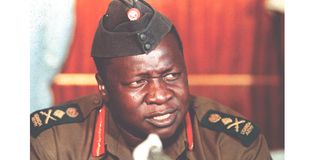The women who endured domestic violence at the hands of Idi Amin

Former Ugandan president Idi Amin Dada. Book depicts him as a serial domestic violence offender.
What you need to know:
- In Idi Amin's Shadow: Women Gender and Militarism in Uganda, by scholar of African studies Alicia C. Decker, is a riveting historical masterpiece.
- The book gives insightful account of leader’s married life.
Idi Amin’s propensity for violence was not random or accidental but a product of historical calculation.
To maintain colonial rule, the British cultivated a militarised version of masculinity in their recruitment of soldiers from the West Nile province, producing loyal warriors who were not afraid to fiercely and thoughtlessly mutilate and kill perceived opponents.
Amin, a former Kampala Grand Imperial Hotel bellboy and assistant cook at Magamaga Jinja Barracks, was promoted from corporal to sergeant in 1954. Because of his “thirst for blood and murder,” he was referred to as a “brilliant chap” by his British superiors.
They elevated him to warrant officer and platoon commander in 1958, awarded him the Sword of Honour in 1959 after his military stints in Gilgil, Kenya, and as a mass murderer in Turkana. This led to his appointment as lieutenant, although he barely passed his written exam.
In Idi Amin's Shadow: Women Gender and Militarism in Uganda, by scholar of African studies Alicia C. Decker, is a riveting historical masterpiece.
Alicia interviewed more than 100 disenfranchised Ugandan women, including Amin’s former wives, about surviving the despot's autocracy, reconstructing the experiences of a gender that had been omitted from historical records during Amin’s tumultuous dictatorial regime.
Sarah Mutesi Kibedi met Amin in November 1961, when she was 22, while working as a dressmaking apprentice at the Singer Sewing Machine Company in Jinja.
After Amin's proposal, Sarah began an Islamic conscription course and changed her name to Malyam.
Despite her parents’ opposition, she wed Amin in March 1962, just eight months before Uganda’s independence on October 9, 1962.
After three years of marriage, Malyam learnt of her husband’s infidelity and crafted a scheme to bust him. She informed Amin that she was travelling upcountry to visit her parents in Busoga. Amin encouraged her to take a holiday and stay as long as she pleased.
After dusk, Malyam secretly returned home in a taxi. She walked into the house, found Amin in the living room chatting to a senior air force officer, and marched straight into the bedroom, where she found a naked woman lying on their bed.
She flew into a rage, grabbed her by the hair and hit her as hard as she could. Amin apologised, promising never to be unfaithful again. Less than four months later, the woman, Kay Adroa, became his second wife.
Kay and Amin were from the same West Nile region and had known each other from childhood. They were distant cousins along Amin’s matrilineal kinship.
Kay’s father, a clergyman, disapproved of her relationship with Amin, partly because of the significant educational differences between the two. Kay had attended some of the best schools and became one of the first Lugbara women to study at Makerere University.

The cover of In Idi Amin's Shadow: Women Gender and Militarism in Uganda, by scholar of African studies Alicia C. Decker.
Amin, in contrast, had completed only four years of primary school, was semi-literate, and had a menacingly violent reputation. Nonetheless, the couple went ahead and wed in May 1966.
Malyam knew nothing about the wedding until it was broadcast on national television. Although she was humiliated, she wasn't in a financially secure position to leave her marriage. She was also pregnant with her fourth child and was taking care of four additional children from Amin’s previous relationships.
The first few months were excruciatingly difficult for Malyam. Amin expected them to alternate spending one week alone in the spare room and the next in the main bedroom with their husband.
In early 1967, Amin moved his family to his Command Post on Prince Charles Drive in Kampala. Soon, rumours about a new mistress named Norah Aloba Enin emerged in the city.
The two wives decided to confront Amin with his infidelity. A pregnant Malyam told him he was degrading himself and his wives. He went berserk, punching and knocking her to the floor, before turning to Kay.
He assaulted them for several minutes, then left them lying on the floor concussed, bruised and bleeding. The battle over Norah came to a violent conclusion several weeks later when Amin invited the three women to the same party.
Neither wife knew that Norah would attend, only to see her gliding across the dance floor in Amin’s arms.
Temperamental Kay was so dejected she grabbed Norah and wrestled her to the floor. Amin led them away and when they arrived home, he unleashed his rage, brutally assaulting all the three and accusing them of disgracing him in public.
Malyam, who was eight months pregnant, almost lost her fifth child. One week later, she learnt that Amin had married Norah, who joined the marital bed rotation at Amin’s Command Post, while he continued having numerous affairs.
In March 1974, Amin divorced his three wives and married Madina Nnamwandu, before coercively marrying Sarah Kyolaba on August 1, 1974, on the penultimate day of the OAU conference in Kampala.
Sarah had been engaged and pregnant with her fiancé’s child. Amin ordered the killing of her fiancé then organised a wedding celebration that was attended by visiting African heads of state.
The reviewer is a novelist, Big Brother Africa 2 Kenyan representative and founder of Jeff’s Fitness Centre (@jeffbigbrother).





